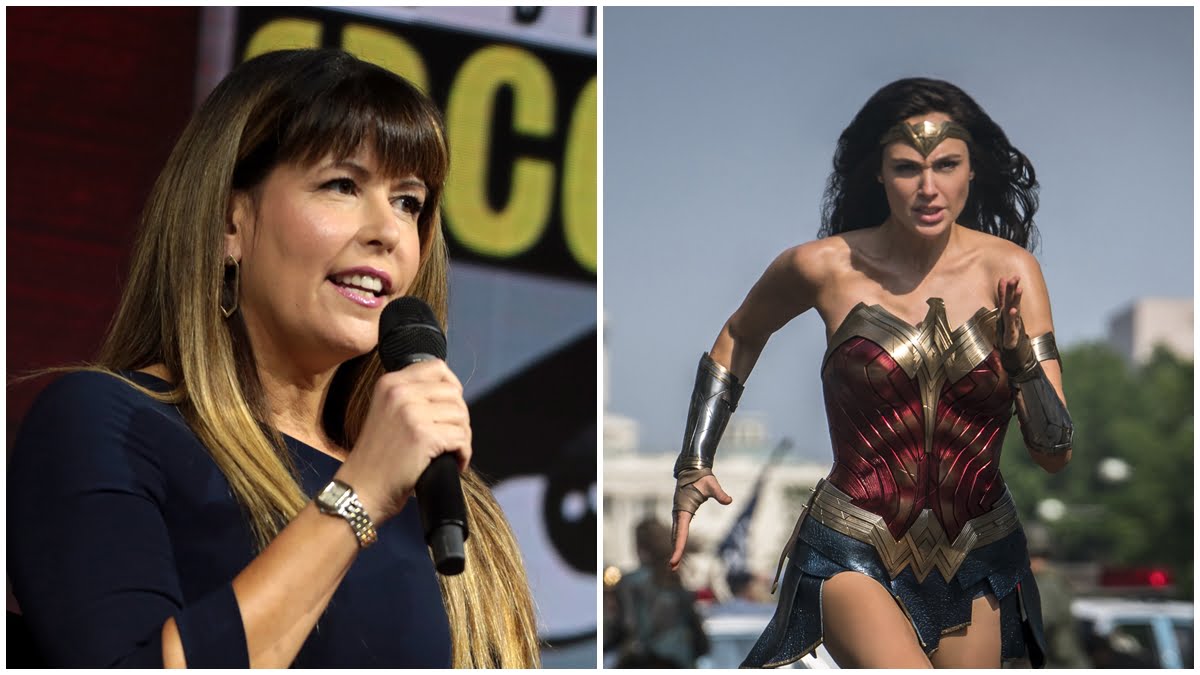When the 75 years old, much praised and blamed feminist icon of Wonder Woman was given into the hands of Patty Jenkins, now the only female director of a female super hero movie, we expected so much from her, not only to liberate the character from objectification but also from sidelining. Therefore, it is important to the feminist pop culture discourse to investigate whether Wonder Woman (2017) and Wonder Woman 1984 (released in 2020), both directed by Patty Jenkins did any justice to the character.
The movie portrays Diana or Wonder Woman as made from sculpture, marking her imperfection (because she is neither a god nor a human). Though she rescues Steve Tremor from the crash and leads all the fighting scenes, she is often just treated like a doll in the hands of men (comparable to ‘power in the hands of a fool’). The movie begins with her saying, ”I always wanted to save the world”: she considered this to be her sacred duty. This equates her position to that of a sacrificing, all-giving mother: ‘To restore the love and peace of the world by killing Aries’. Together with her comical appearance, girly touch and liking for babies, the stereotypes around female characters are reinstated in the Patty Jenkins’ Wonder Woman ventures too.
The movie portrays Diana or Wonder Woman as made from sculpture, marking her imperfection (because she is neither a god nor a human). Though she rescues Steve Tremor from the crash and leads all the fighting scenes, she is often just treated like a doll in the hands of men (comparable to ‘power in the hands of a fool’). The movie begins with her saying, ”I always wanted to save the world”: she considered this to be her sacred duty.
Also read: A Feminist Reading Of Wonder Woman
Several instances in the movie with Steve Trevor reinforces the idea that with or without power a woman needs the protection and love of a man: when Steve Trevor covers her with his coat (even when she refuses) and tells her, “Stay here! I’ll go ahead”, she seems to give in to him. And it is only in the climax that she does not give in to what he says (Steve Trevor- ”You can do nothing about it. You need to move on”). To Steve, she always becomes a distraction (“You are too distracting”) and often glances all over her with desire. The scene at the dressing shop ridicules the idea that women dress up not for themselves but for men.
Dr Maru in the Wonder Woman (2017) acts as a foil to Diana, catering to the angel/witch binary trope with her evil, but in both the cases the good or evil is only furthered by the presence of men. It also implies that women are incapable of independent actions, as witnessed from the life of Diana. It is the appearance of Steve Trevor that changes the course of her life completely.
But, who emerges ultimately as the protagonist in Wonder Woman (2017) is presented ambiguously. Irrespective of the fact that the movie is named after the character of Wonder Woman, Steve Trevor emerges as the hero of the movie and the only possible role for Diana, is reduced to that of a heroine. This idea remains partially concealed except for close scrutiny, nevertheless it is obvious.
But, who emerges ultimately as the protagonist in Wonder Woman (2017) is presented ambiguously. Irrespective of the fact that the movie is named after the character of Wonder Woman, Steve Trevor emerges as the hero of the movie and the only possible role for Diana, is reduced to that of a heroine. This idea remains partially concealed except for close scrutiny, nevertheless it is obvious. Steve Trevor, an English spy, takes the mission to save the world by sacrificing his life, whereas Diana appears numbed in the context when Steve Trevor says, “It has to be me. I can save the world today. You could the save the world”. In the end, her action of killing Aries becomes futile because it does not alter the course of events. And she falls deeply in love and her admiration increases for Steve Trevor. She remembers him faithfully and mourns for him like a faithful widow in Wonder Women 1984. Her love and admiration for him automatically replaces her position to that of a typical heroine that does make any difference in her new role of a superhero (Diana says, “Only love can truly save the world, so I stay, fight and give, for the world that can be, this my mission now.”). As a way of mild resistance, women are shown to be independent with sexual freedom and physical strength (in this case, the Amazonians). This is shown with nuance when Hippolyta says, ”Be careful in the world of me, Diana. They don’t deserve you.”

Also read: The Women Of Shang-Chi
Both the movies do not break away from the typical idea of the ‘damsel in distress’. But for Patty Jenkins who is now on her third directorial venture with Wonder Woman, it will be an important step if she were to breathe life into an independent and free Wonder Woman, without the usual taboos or male supervision for women across the world to draw inspiration from.
Vidhupriya is an independent researcher, currently pursuing Bachelor of Education. She is a Post Graduate in English Literature and Language from the Institute of English, Kerala University. She believes writing is a peaceful weapon to foster equality and change the fixed mindset of society. She is interested in research and writings especially related to Cultural Studies, Film Studies and Feminist Studies. More than this, she is a nature lover and a humanist. Follow her on Facebook, Instagram and LinkedIn.
About the author(s)
Vidhu (she/her) is an emerging writer with Masters in English language and literature, keen on learning the politics of the world around her. She has dreams to create a career in journalism and writing, where she unburdens her self. She has a great taste for movies from varies geographical spans and pens down poetry in magical charms. She is open to projects or research centring on humanities.






This article is really disappointing.
Yes, one can throw light on Gal Gadot’s real-life zionist views while talking about what is problematic about these films. The movie ‘Wonder Woman 1984’ is sexist and I myself have written about this.
https://reelisticviews.com/wonder-woman-1984-tedious-dull-and-sexist-nurturing-endless-disappointment/
But this article is both misrepresents the film and disheartening to read.
The first movie takes place during the early 1900s which saw the peak of sexism and misogyny in the modern world. Male characters are living in a world where women only serve them both as wives and objects of desire. What the film does is expose this male gaze because when Diana steps she has no idea what kind of sexism she has to deal with.
Women dress to please men therefore had to wear stuff “chokes them” or limit their body movement. It is visible in that shopping scene. They are not supposed to enter the office chambers of authorities.
Also, what is with misconstruing of facts?
For eg: ““Stay here! I’ll go ahead”, she seems to give in to him,” it is Diana who says that line before running into a place with loaded guns in the village of Veld, not Steve.
Diana does not ‘give in’ to anything Steve says or does. She rebels. Which is how we saw her go into ‘no man’s land,’ because she doesn’t give in to Steve who says, “this is not what we came here to do.”
“I let you go, you take me to Aries, we made a deal Steve Trevor,” is something she says initially when Steve tried to go on his way.
“What I do is not upto you,” is what she says in the context where men saw her ‘as a distraction.’
Also, there is this thing is character arc or story arc.
You can’t expect a character to be perfect since his or her introduction. There is already a set of criticisms that say that women are rarely shown vulnerable or face challenges in feminist storytelling.
FII has already published articles about why it is problematic to show women perfectly.
https://feminisminindia.com/2021/08/09/faux-girl-power-cinema-advertisements-empowerment/
https://feminisminindia.com/2021/02/15/mulan-disney-review-feminist/
When it comes to women’s character arcs, she needs to face challenges, get the drive. We see Diana face all those challenges. To fight sexism, first, we have to show enduring or facing sexism.
“Together with her comical appearance, girly touch and liking for babies, the stereotypes around female characters are reinstated in the Patty Jenkins’ Wonder Woman ventures too.”
I am sorry but, is this supposed to be a drawback? If it is then this argument is a classic case of internalised misogyny. What is wrong with being ‘girly?’ Should one be ‘manly’ to be strong or relevant? Why can’t women show traditional feminine tropes and likings and still be strong and badass?
Diana is a tough trained warrior and she also likes babies. She comes from a land where women are sculpted from clay, therefore she has never seen babies up until that moment. She was excited to see a baby. Instances of compassion like this are what make her likable and multidimensional as a character.
“Irrespective of the fact that the movie is named after the character of Wonder Woman, Steve Trevor emerges as the hero of the movie and the only possible role for Diana, is reduced to that of a heroine.”
Again, no. Steve is a plot device and motivator for Diana. He stops one flight from bombing the city. Diana ends the war. The movie follows her quest of finishing her mission on behalf of Amazon warriors. In the real world, Steve gets more recognition because he is a soldier and Diana wanted to conceal her identity.
Then again, I can’t disagree that ‘WW 84’ had sexist instances.
Please write an article on the following. Men spend their entire lives earning for women but when a woman has to spend on a man, what happens is shown in the trailer of the movie Jersey. Shahid Kapoor asks his wife for only Rs. 500, and that too for his son, but she refuses, and when he is forced to steal from her, she slaps him. Thappad! Where is the outrage? We all saw in the trailer of Sooryavansham how Katrina Kaif slaps Akshay Kumar just because he is overly passionate about his duty. Again, no outrage on social media. Now just reverse the genders.